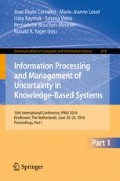Abstract
Fuzzy implication functions are used to model fuzzy conditional and consequently they are essential in fuzzy logic and approximate reasoning. From the theoretical point of view, the study of how to construct new implication functions from old ones is one of the most important topics in this field. In this paper a construction method of implication functions from a t-conorm S (or any disjunctive aggregation function F), a fuzzy negation N and an implication function I is studied. Some general properties are analyzed and many illustrative examples are given. In particular, this method shows how to obtain new implications from old ones with additional properties not satisfied by the initial implication function.
Access this chapter
Tax calculation will be finalised at checkout
Purchases are for personal use only
References
Aguiló, I., Carbonell, M., Suñer, J., Torrens, J.: Dual representable aggregation functions and their derived S-implications. In: Hüllermeier, E., Kruse, R., Hoffmann, F. (eds.) IPMU 2010. LNCS, vol. 6178, pp. 408–417. Springer, Heidelberg (2010)
Aguiló, I., Suñer, J., Torrens, J.: A characterization of residual implications derived from left-continuous uninorms. Inf. Sci. 180(20), 3992–4005 (2010)
Aguiló, I., Suñer, J., Torrens, J.: New types of contrapositivisation of fuzzy implications with respect to fuzzy negations. Inf. Sci. 322, 223–226 (2015)
Baczyński, M., Beliakov, G., Bustince Sola, H., Pradera, A. (eds.): Advances in Fuzzy Implication Functions. STUDFUZZ, vol. 300. Springer, Heidelberg (2013)
Baczyński, M., Jayaram, B.: Yager’s classes of fuzzy implications: Some properties and intersections. Kybernetika 43, 157–182 (2007)
Baczyński, M., Jayaram, B.: Fuzzy Implications. STUDFUZZ, vol. 231. Springer, Heidelberg (2008)
Baczyński, M., Jayaram, B.: (U, N)-implications and their characterizations. Fuzzy Sets Syst. 160, 2049–2062 (2009)
Balasubramaniam, J.: Yager’s new class of implications \(J_f\) and some classical tautologies. Inf. Sci. 177, 930–946 (2007)
Beliakov, G., Pradera, A., Calvo, T.: Aggregation Functions: A Guide for Practitioners. STUDFUZZ, vol. 221. Springer, Heidelberg (2007)
Jayaram, B., Mesiar, R.: On special fuzzy implications. Fuzzy Sets Syst. 160(14), 2063–2085 (2009)
De Baets, B., Fodor, J.C.: Residual operators of uninorms. Soft. Comput. 3, 89–100 (1999)
Klement, E.P., Mesiar, R., Pap, E.: Triangular Norms. Kluwer Academic Publishers, Dordrecht (2000)
Hlinená, D., Kalina, M., Kral, P.: Implications functions generated using functions of one variable. In: [4], pp. 125–153 (2013)
Mas, M., Monserrat, M., Torrens, J.: Two types of implications derived from uninorms. Fuzzy Sets Syst. 158, 2612–2626 (2007)
Mas, M., Monserrat, M., Torrens, J., Trillas, E.: A survey on fuzzy implication functions. IEEE Trans. Fuzzy Syst. 15(6), 1107–1121 (2007)
Massanet, S., Riera, J.V., Ruiz-Aguilera, D.: On Fuzzy Polynomial Implications. In: Laurent, A., Strauss, O., Bouchon-Meunier, B., Yager, R.R. (eds.) IPMU 2014, Part I. CCIS, vol. 442, pp. 138–147. Springer, Heidelberg (2014)
Massanet, S., Torrens, J.: On a new class of fuzzy implications: h-Implications and generalizations. Inf. Sci. 181, 2111–2127 (2011)
Massanet, S., Torrens, J.: Threshold generation method of construction of a new implication from two given ones. Fuzzy Sets Syst. 205, 50–75 (2012)
Massanet, S., Torrens, J.: On the vertical threshold generation method of fuzzy implication and its properties. Fuzzy Sets Syst. 226, 232–252 (2013)
Massanet, S., Torrens, J.: An overview of construction methods of fuzzy implications. In: [4], pp. 1–30 (2013)
Ruiz, D., Torrens, J.: Residual implications and co-implications from idempotent uninorms. Kybernetika 40, 21–38 (2004)
Ruiz-Aguilera, D., Torrens, J.: S- and R-implications from uninorms continuous in ]0,1[2 and their distributivity over uninorms. Fuzzy Sets Syst. 160, 832–852 (2009)
Shi, Y., Van Gasse, B., Ruan, D., Kerre, E.: On a new class of implications in fuzzy logic. In: Hüllermeier, E., Kruse, R., Hoffmann, F. (eds.) IPMU 2010. CCIS, vol. 80, pp. 525–534. Springer, Heidelberg (2010)
Shi, Y., Van Hasse, B., Ruan, D., Kerre, E.: Fuzzy implications: Classification and a new class. In: [4], pp. 31–53 (2013)
Trillas, E., Mas, M., Monserrat, M., Torrens, J.: On the representation of fuzzy rules. Int. J. Approximate Reasoning 48, 583–597 (2008)
Vemuri, N.R., Jayaram, B.: Representations through a monoid on the set of fuzzy implications. Fuzzy Sets Syst. 247, 51–67 (2014)
Vemuri, N.R., Jayaram, B.: The \(\star \)-composition of fuzzy implications: Closures with respect to properties, powers and families. Fuzzy Sets Syst. 275, 58–87 (2015)
Yager, R.R.: On some new classes of implication operators and their role in approximate reasoning. Inf. Sci. 167, 193–216 (2004)
Acknowledgments
This paper has been partially supported by the Spanish grant TIN2013-42795-P.
Author information
Authors and Affiliations
Corresponding author
Editor information
Editors and Affiliations
Rights and permissions
Copyright information
© 2016 Springer International Publishing Switzerland
About this paper
Cite this paper
Aguiló, I., Suñer, J., Torrens, J. (2016). A New Look on Fuzzy Implication Functions: FNI-implications. In: Carvalho, J., Lesot, MJ., Kaymak, U., Vieira, S., Bouchon-Meunier, B., Yager, R. (eds) Information Processing and Management of Uncertainty in Knowledge-Based Systems. IPMU 2016. Communications in Computer and Information Science, vol 610. Springer, Cham. https://doi.org/10.1007/978-3-319-40596-4_32
Download citation
DOI: https://doi.org/10.1007/978-3-319-40596-4_32
Published:
Publisher Name: Springer, Cham
Print ISBN: 978-3-319-40595-7
Online ISBN: 978-3-319-40596-4
eBook Packages: Computer ScienceComputer Science (R0)

